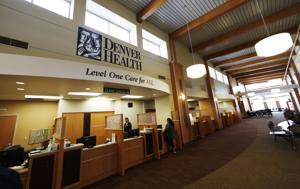Op-Ed: Cutting health care budgets will make this recession worse for working women – and everyone else too

One of the biggest challenges in politics and public policy is that people spend most of their time working in silos. That is, they work on a narrow range of issues or even just one issue.
Reporters have beats. Lawmakers have committee assignments. Subject matter experts usually work in just one discipline. Interest groups have, well, their interests.
To be sure: We need specialists in politics and public policy. But when the champions of a single issue pursue their own interests to the exclusion of everything else, specialization becomes the enemy of good public policy. What seems like a solution to one problem actually makes another problem or set of problems much, much worse.
For example: Colorado lawmakers working on health care policy may not realize how some proposals could make the COVID-19 recession worse for working women, which will in turn make the recession worse for everyone.
In addition to fighting COVID-19, health care workers have also had to deal with state cuts in Medicaid reimbursement rates and other health-related programs. These cuts, which started last year, mean reduced funding for hospitals and other health care facilities in the middle of a global pandemic – and in the middle of an economic crisis that is forcing more people to enroll in Medicaid, which provides safety-net health coverage to low-income households.
Nonetheless, these cuts may be continued in the Colorado state budget for fiscal year 2021-22, which starts in July. But that’s not all.
Some lawmakers are also pressing ahead with a Colorado version of the public option, which was proposed during the 2020 legislative session but abandoned as the pandemic swept across the nation.
The public option is a government-controlled health plan that, among other things, pays health care providers much less than private insurance companies do. Under these payment cuts, as many as 4,800 Coloradans who work in health care could lose their jobs and hospitals could lose $536 million to $1.1 billion in annual revenues, according to the Common Sense Institute, where I’m a fellow.
Those estimated losses didn’t include the impact of fighting COVID-19. But now, Colorado hospitals are projecting COVID-related losses of $2 billion to $4.4 billion, even after emergency financial aid from the federal government.
These impacts are so severe that health care now ranks as one of the hardest hit industries in our state, according to a Legislative Council staff report. In the Feb. 11 report, the legislature’s economic advisers said the health care and social services sector was one of the “biggest job losers” in the private economy last year, alongside the arts, entertainment and recreation industry and the accommodation and food services industry.
But there’s more: The same report says 77% of workers in Colorado’s health care and social services sector are women. This means most of the jobs lost in health care last year belong to women, and if the state legislature continues to push budget cuts across the health care sector, most of the jobs on the line will belong to women.
The COVID-19 recession is already having a disproportionate impact on women, in what many policy experts – including CSI President and CEO Kristin Strohm – have called the She-Cession. According to CSI, more than 20,000 Colorado mothers have left the labor force over the past year, due to layoffs and reduced hours in their industries and the lack of in-person school and child care options.
Public policy that forces deeper budget cuts across the healthcare system – a sector of the Colorado economy which is more than three-quarters female – will make that already alarming trend even worse.
“If we don’t get women back to work, the economy is not going to recover, and we will lose generation of progress for working women,” Strohm recently told Fox 31 Denver.
In the course of my research and policy work, I have been fortunate to meet with many frontline health care professionals. I’m sure that makes me sympathize with their situation more than most.
But does anyone really believe, if they stop to think about it, that we don’t need these women and men in their jobs, to support both public health and economic recovery?
Two of the most respected voices in the Colorado business community – Loren Furman of the Colorado Chamber of Commerce and Rachel Beck of the Colorado Springs Chamber & EDC – recently offered a stark reminder of the desperate need for more jobs in our communities.
“Colorado’s unemployment rate is worse than nearly every other state in the nation,” Furman and Beck wrote in a Feb. 24 column for Colorado Politics. Therefore, lawmakers need to “look at the big picture” before passing new laws, because those laws “have consequences that reach far beyond the businesses they directly impact.”
Good intentions are laudable, but they don’t create jobs. In fact, when policymakers act on their good intentions without considering the bigger picture and the broader consequences of the policies they favor, those good intentions can actually cost jobs.
Disclaimer: This content is distributed by The Center Square
